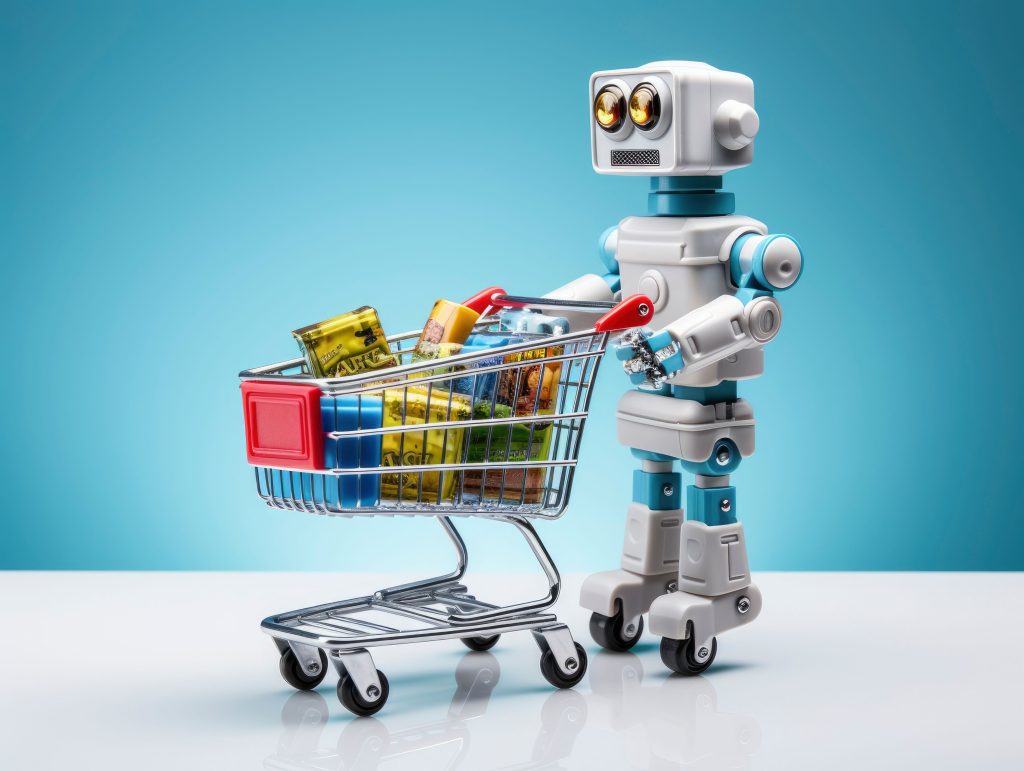Home » Blog » E-Commerce » The Impact of Custom AI Development in Revolutionizing E-Commerce
The Impact of Custom AI Development in Revolutionizing E-Commerce

Gone are the days when e-commerce was simply about having a website for an online shop. It is dynamic now and it’s changing rapidly. Every business is trying to keep pace with the fast-changing customer demands and e-commerce trends. However, there has been a major paradigm shift in how we approach e-commerce. Custom AI development revolutionizes e-commerce. It has totally revolutionized online shopping.
Integrating artificial intelligence in business operations allows businesses to anticipate their customer’s behavior, requirement, and expectation. This information can be used to enhance the business and meet the customers’ needs preemptively. Sounds futuristic, right? Well, there is much more to the AI trend. The global artificial intelligence market is estimated to be over $136 billion in 2023, reaching as much as $1.8 trillion by 2030. A rise of this magnitude is not just an indicator of growth; it actually marks the beginning of a revolution. If you are not using artificial intelligence in your favor, you are letting a huge opportunity go by. Let’s explore the ins and outs of AI development in e-commerce.
The New Age of E-commerce and the Rise of Custom AI
E-commerce has grown way beyond websites and apps—it’s a whole ecosystem now. Think of the Amazon product recommendations or the chatbots that answer your questions while shopping on your favorite site. These aren’t just a few random features, it’s actually AI that’s assisting you.
According to a report from Grand View Research, the global AI market is going to expand with a compound annual growth rate of 37.3% from 2023 to 2030. This growth rate indicates an extensive use of artificial intelligence across different industries in e-commerce. Although pre-made AI solutions will not cater to general business operations, they do not meet the specific needs of a company, which vary from business to business. This is where custom AI tools come into play. Custom AI development revolutionizing e-commerce offers personalized automated solutions that accommodate unique business requirements. After all, providing a personalized shopping experience to the customers makes all the difference. Using custom AI tools means that instead of following the trends, you would be the one creating them.
How Custom AI is Revolutionizing E-Commerce!
The generative AI in software development revolution is here to change the methods of business transactions, the relationship between a business and its customers, and the overall shopping experience. This approach gives the client a feeling that their favorite e-store knows exactly what they need and predicts it even before they search for it. And that is custom AI for you!
It’s not just an upgradation of technology, but a completely new way of doing online business. It is more like a whole new shopping style. Online shopping has become smarter, faster, and more personalized. Let’s explore more about the marvel of this shopping innovation.
Personalized Shopping Experience
Basic shopping experiences are a thing of the past. The customers appreciate it when they are made to feel special. Thai observation can be backed by the Epsilon study that says, 80% of the customers showed that they are more likely to purchase from a brand that offers personalized shopping experience.
With custom AI, personalization can be taken to a whole new level. Thus driving not only sales but also customer loyalty. Through custom AI development revolutionizing e-commerce, businesses can create customized experiences that are specific to the customer’s personality. AI tools gather data from past purchases, customer’s surfing behavior, and, even, social media activity, to predict which products a customer is most likely to buy. It’s not just about product recommendations; it’s about creating seamless shopping experiences.
Efficient Inventory Management
It’s quite hard to run an e-commerce business with inventory in stock. Possibility #1 – Stock more, you are wasting your resources. Possibility #2 – Stock less, you lose in sales.
By integrating the AI inventory management tools, you can maintain optimal inventory and stock levels. AI algorithms learn from historical sales data, market trends, and even weather conditions to forecast product demand with a high level of accuracy. AI tools help a business maintain optimal levels of stock in the inventory and reduce the risks of overstocking or stockouts. As suggested by the data collected through the McKinsey report, AI-driven supply chain management can reduce forecasting errors by as much as 50% and missed sales by as much as 65%. These figures certainly are an eye-opener. Effective inventory management means that not only will there be more profit, but more importantly, the customers will always get what they want.
Read More: A Comprehensive Guide to E-Commerce Software Development
Dynamic Pricing Strategies
Pricing can be somewhat tricky in e-commerce. Make the price too high and the customers will turn away. Make it too low, and it just eats into your profit. Imagine a scenario where you have a system continuously analyzing the market conditions and adjusting the product prices as required. This is custom AI in e-commerce!
With AI dynamic pricing, the product prices automatically change in real time based on product demand, competition, and customer behavior. This strategy offers flexibility to the business and helps it become competitive enough to gain maximum profits. A Deloitte study found that dynamic pricing can yield up to 12% higher revenues. So AI offers a solid ground for business growth in e-commerce.
Improved Customer Support
Poor customer support really damages the reputation of an e-commerce business. Every customer expects a quick and effective solution to their problems. Failing to timely respond to customer queries can result in losing them.
With custom-made AI-powered chatbots, it is possible to handle a huge volume of queries simultaneously on a 24/7 basis with instant responses to frequent questions. But that is not all. The next milestone of AI will be to analyze the sentiment around customer queries and only forward complex issues to human agents while handling all other queries automatically.
Fraud Detection and Prevention
Frauds are becoming a real concern in e-commerce. With an increased number of online transactions, opportunities for fraudulent activities also open up. The PwC survey data reveals that within the last 24 months, 47% of companies had fallen prey to fraud. On average, there were six fraud incidents per company.
AI tools demonstrate a strong potential to mitigate these security risks and defend your business better. AI business tools allow the usage of real-time data on transactions to improve fraud detection and prevention mechanisms. AI algorithms thoroughly scan the transaction data looking for patterns indicative of something wrong and then send alerts for possible fraudulent activity. This is a proactive approach to securing your business and developing trust among your customers.
The Future of AI in E-Commerce
AI is definitely the future of e-commerce. AI is revolutionizing e-commerce. It is not just a buzzword anymore; it’s real. From voice-activated shopping assistants to virtual fitting rooms, the possibilities are massive. The rise of AI in e-commerce will place business innovation on the front lines. Be it customer experience, process optimization, or security, AI is changing e-commerce in unimaginable ways.
Remember that, in the business world, it’s always the survival of the fittest. AI has almost become an indispensable necessity for any business that wants to experience excellence in this cut-throat world of e-commerce. Businesses that will invest in custom AI development today will take charge of business innovation tomorrow.
Recent Posts
- The Future of Software Engineering by 2030 October 13, 2025
- How AI Chatbots Boost Customer Support & CSAT September 1, 2025
- Top Software Development Companies 2025: Choose the Right Partner August 8, 2025
- Healthcare Software Development Services: What to Expect in 2025 July 17, 2025
- How To Hire Software Developers For Your Startup June 27, 2025
Categories
- Business Solutions (12)
- Digital Marketing (2)
- E-Commerce (3)
- Mobile App (11)
- Software Developers (21)
- Software Teams (15)
- Team Outsourcing (14)
- Tech Trends (10)
- UI UX Design (4)
- Web Development (8)

